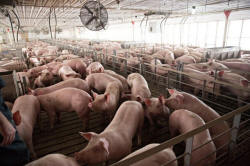|
The technical requirements implement a deal announced last
August following a meeting between Argentine President Mauricio
Macri and U.S. Vice-President Mike Pence in Buenos Aires.
Argentina had blocked imports of U.S. pork for about 26 years,
citing animal health concerns. The deal is expected to open up a
potential $10-million-per-year market for U.S. pork producers,
the U.S. agencies said.
The United States, the world's leading pork exporter with global
sales of $6.5 billion, exports about 27 percent of its pork
production, making it highly dependent on foreign markets at a
time when hog supplies are growing seasonally.
Japan, Mexico and Canada are the top three destinations for U.S.
pork.
Since the announcement in August, USDA and USTR have been
working with Argentina's Ministry of Agro-Industry on new,
science-based market access terms that are consistent with
international animal health standards.
"Once the people of Argentina get a taste of American pork
products after all this time, we are sure they'll want more of
it," USDA Secretary Sonny Perdue said in a statement.
The deal shows the Trump administration's commitment to trade by
launching markets for agricultural products, Perdue added.
(Reporting by David Lawder, Editing by Sherry Jacob-Phillips)
[© 2018 Thomson Reuters. All rights
reserved.] Copyright 2018 Reuters. All rights reserved. This material may not be published,
broadcast, rewritten or redistributed.
Thompson Reuters is solely responsible for this content.
 |
|




